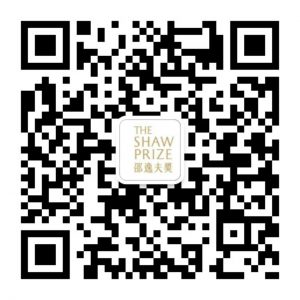for their pioneering research in cosmology, in particular for their studies of fluctuations in the cosmic microwave background. Their predictions have been verified by an armada of ground-, balloon- and space-based instruments, leading to precise determinations of the age, geometry, and mass-energy content of the universe.
The Shaw Prize in Astronomy 2025 is awarded in equal shares to John Richard Bond, Professor of the Canadian Institute for Theoretical Astrophysics and University Professor at the University of Toronto, Canada and George Efstathiou, Professor of Astrophysics at the University of Cambridge, UK for their pioneering research in cosmology, in particular for their studies of fluctuations in the cosmic microwave background. Their predictions have been verified by an armada of ground-, balloon- and space-based instruments, leading to precise determinations of the age, geometry, and mass-energy content of the universe.
Cosmology has undergone a revolution in the past two decades, driven mainly by increasingly precise measurements of the angular power spectrum of fluctuations in the temperature and polarization fields of the cosmic microwave background, a relic of the early universe, most notably by NASA’s Wilkinson Microwave Anisotropy Probe spacecraft (2001–2010) and the European Space Agency’s Planck spacecraft (2009–2013). These fluctuations are small — the strength of the background radiation is the same in all directions to better than 0.01% and it is only slightly polarized — but they offer a glimpse of the universe when it was very young, a test of many aspects of fundamental physics, insights into the nature of dark matter and dark energy, and measurements of many fundamental cosmological parameters with accuracies unimaginable to cosmologists a few decades ago.
Cosmology has undergone a revolution in the past two decades, driven mainly by increasingly precise measurements of the angular power spectrum of fluctuations in the temperature and polarization fields of the cosmic microwave background, a relic of the early universe, most notably by NASA’s Wilkinson Microwave Anisotropy Probe spacecraft (2001–2010) and the European Space Agency’s Planck spacecraft (2009–2013). These fluctuations are small—the strength of the background radiation is the same in all directions to better than 0.01% and it is only slightly polarized—but they offer a glimpse of the universe when it was very young, a test of many aspects of fundamental physics, insights into the nature of dark matter and dark energy, and measurements of many fundamental cosmological parameters with accuracies unimaginable to cosmologists a few decades ago.
Although many researchers contributed to the development of the theoretical framework that governs the behaviour of the cosmic microwave background, Bond and Efstathiou emphasised the importance of the background as a cosmological probe and took the crucial step of making precise predictions for what can be learned from specific models of the history and the composition of the mass and energy in the universe. Modern numerical codes used to interpret the experimental results are based almost entirely on the physics developed by Bond and Efstathiou. Their work exemplifies one of the rare cases in astrophysics where later experimental studies accurately confirmed unambiguous, powerful theoretical predictions. The interpretation of these experiments through Bond and Efstathiou’s theoretical models shows that the spatial geometry of the observable universe is nearly flat, and yields the age of the universe with a precision of 0.15%, the rate of expansion of the universe with a precision of 0.5%, the fraction of the critical density arising from dark energy to better than 1%, and so on. The measurements also strongly constrain theories of the early universe that might have provided the initial “seed” for all the cosmic structure we see today, and the nature of the dark matter and dark energy that dominate the mass-energy content of the universe.
John Richard Bond was born in 1950 in Toronto, Canada and is currently a Professor of the Canadian Institute for Theoretical Astrophysics and University Professor at the University of Toronto, Canada. He received his Bachelor’s degree from the University of Toronto in 1973 and a PhD from the California Institute of Technology, USA in 1979. Following postdoctoral fellowships at the University of California, Berkeley, USA and the University of Cambridge, UK, he was appointed Assistant Professor (1981–1985), then Associate Professor (1985–1987) at Stanford University, USA. In 1985, he moved to the Canadian Institute for Theoretical Astrophysics (CITA) at the University of Toronto, where he was successively Professor till 2000 and University Professor (2000–). He has served as Director of CITA for a decade (1996–2006). He is also a Fellow of the Royal Society of Canada, the Royal Society of London, the American Physical Society, an International Honorary Member of the American Academy of Arts and Sciences and an International Member of the US National Academy of Sciences.
George Efstathiou was born in 1955 in London, UK and is currently Emeritus Professor of Astrophysics (1909) at the University of Cambridge, UK. He received his BA in Physics from the University of Oxford, UK in 1976 and PhD in Astronomy from Durham University, UK in 1979. He has held postdoctoral fellowships at the University of California, Berkeley, USA (1979–1980) and the University of Cambridge (1980–1988). He was Savilian Professor of Astrophysics (1988–1997) at Oxford, where he served as Head of Astrophysics until 1994. He returned to Cambridge in 1997 as Professor of Astrophysics, where he also served as Director of the Institute of Astronomy (2004–2008) and the first Director of the Kavli Institute for Cosmology (2008–2016). He received the 2022 Gold Medal of the Royal Astronomical Society. He is a Fellow of the Royal Society of London and the Royal Astronomical Society, UK.
